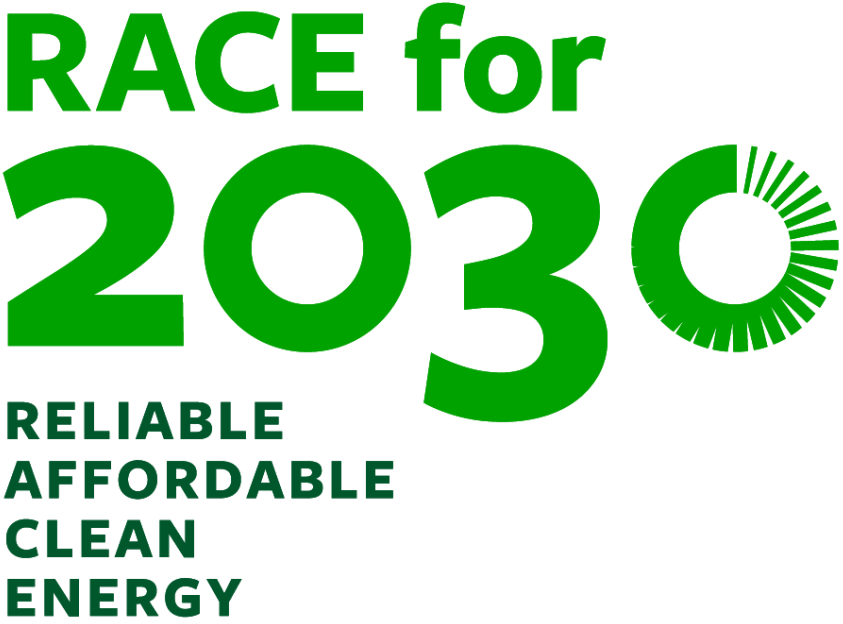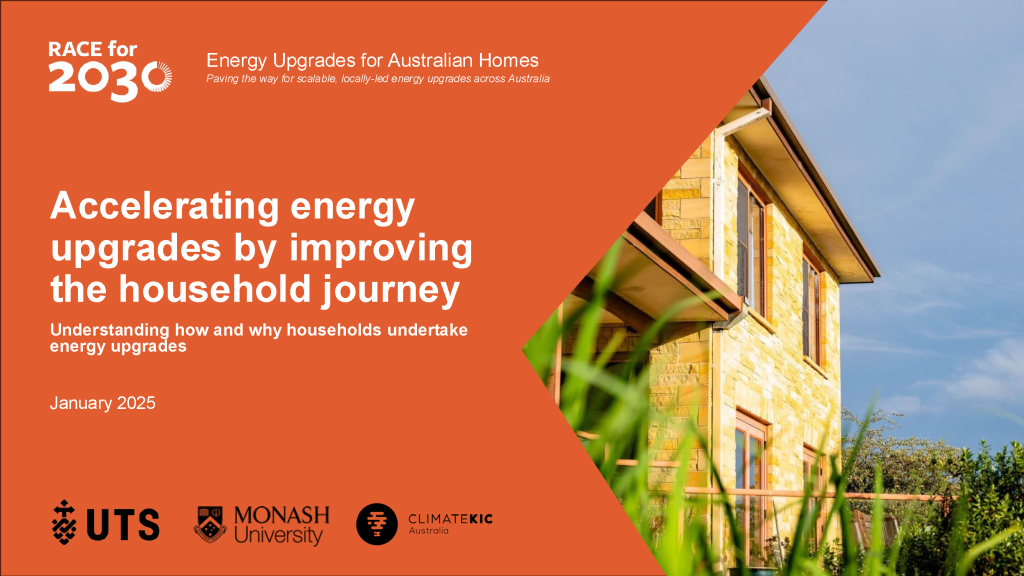To scale energy upgrades, local initiatives need a supportive policy and funding environment. Led by UNSW, this research identifies the policy settings and financial levers that enable scalable, community-driven upgrades—ensuring the EUAH platform can connect program organisers with relevant policy insights and opportunities for funding or guidance.
Resources will include:
- Policy briefs and funding mechanism recommendations for State and Federal governments
- Interactive policy database (federal, state, local)
- Policy tool that provides local councils and communities with a suite of options to illustrate the range of policy and program initiatives taken by local councils, particularly around enduring policy challenges. This will provide knowledge sharing across local councils, which are at different stages of their policy development and implementation.

Natasha Larkin (UNSW)
Research Fellow, Centre of Sustainable Development Reform
Project Lead: Policy and Regulation
Community-led and council-led programs face different delivery challenges. Led by Monash Sustainable Development Institute (MSDI) and UTS, this research identifies success factors and scalable delivery models. It guides program organisers through the program design process, providing tools and resources that support tailored upgrade programs across various community, housing, and climate contexts.
Resources will include:
- Ecosystem maps that allow program organisers to navigate the complex energy upgrade landscape
- Program design accelerator workshops and a toolkit that guides organisations through the home upgrade program design process
- Good practice case studies to share learnings from successful upgrade programs

Ed Langham (UTS)
Research Director, Insitute for Sustainable Futures
Project Co-Lead: Community Implementation Models

Paris Hadfield (Monash University)
Research Fellow, Monash Sustainable Development Institute
Project Co-Lead: Community Implementation Models
Real change starts at the household level. Led by MSDI & BehaviourWorks, this research ensures the EUAH platform incorporates behavioural insights that reflect how households make upgrade decisions, helping program organisers design outreach and support strategies that work.
Resources will include:
- Impact Likelihood matrix that helps program organisers focus on high-impact behaviours that are most likely to be adopted in their climate zone
- Behavioural diagnosis field guide to support program organisers understand community perspectives on energy upgrade barriers and drivers
- Intervention matching tool that allows program organisers to prioritise intervention options based on robust evidence
Communities need to understand what upgrades make sense for their housing stock. This research by CSIRO & QUT provides the modelling backbone for the EUAH platform. It delivers tools that help program organisers assess potential energy savings, upgrade costs, and co-benefits at a local, regional, or national scale.
Resources will include:
- Residential building stock analysis tool to compare upgrade costs and benefits and create a business case for upgrades without extensive data collection
- An interactive upgrade scenario tool to identify the most impactful combination of upgrades for current and future climate conditions

Dong Chen (CSIRO)
Senior Principal Research Scientist
Project Lead: Building stock and benefits modelling
For home energy upgrades to succeed at scale, reliable access to quality products, suppliers, and skilled service providers(installers) is essential. The RMIT research team maps gaps in the supply chain and co-develops training and product selection tools – helping program organisers to make informed decisions and to connect with trusted suppliers, high-quality products, and emerging workforce pipelines.
Resources will include:
- An online product/supplier selector tool that enables program organisers, as well as government and community group representatives, to identify suitable energy-efficient products based on their requirements and preferences
- A geospatial tool to help understand local supply options and limitations
- A value stream mapping framework designed to uncover supply chain bottlenecks of upgrading products to inform targeted policy decisions

Muhammad Abdulrahman (RMIT)
Associate Professor of Supply Chain and Logistics Management
Project Lead: Supply chain development
All research insights feed into the design and development of the online EUAH platform. MSDI and UTS are working closely with partner programs to ensure that research outputs are accessible, intuitive, and tailored to real-world program delivery—from first engagement to successful installation. The platform’s content and design will draw on the evaluation of participating partner programs and the supporting activities of the EUAH project.
Resources will include:
- Online home energy upgrades platform, providing a suite of tools and resources to enable upgrade program design, implementation and evaluation
- Educational resources and access to knowledge sharing forums, enabling program organisers to navigate the program design and delivery process through self-paced learning and access to interactive forums.
- Implementation and impact modelling tools to support program organisers to embed monitoring, evaluation and continuous learning into upgrade programs

Rob Raven (Monash University)
Professor of Sustainability Transitions and Deputy Director, Monash Sustainable Development Institute
Chief Investigator and Co-Lead – Platform development

Liam Smith (Monash University)
Director, BehaviourWorks Australia
Chief Investigator and Co-Lead – Platform development

Chris Reidy (UTS)
Associate Director Learning and Development
Co-Lead – Platform development
To scale energy upgrades, local initiatives need a supportive policy and funding environment. Led by UNSW, this research identifies the policy settings and financial levers that enable scalable, community-driven upgrades—ensuring the EUAH platform can connect program organisers with relevant policy insights and opportunities for funding or guidance.
Resources will include:
- Policy briefs and funding mechanism recommendations for State and Federal governments
- Interactive policy database (federal, state, local)
- Policy tool that provides local councils and communities with a suite of optionsto illustrate the range of policy and program initiatives taken by local councils, particularly around enduring policy challenges. This will provide knowledge sharing across local councils, who are at different stages of their policy development and implementation.
Community-led and council-led programs face different delivery challenges. Led by Monash Sustainable Development Institute (MSDI) and UTS, this research identifies success factors and scalable delivery models. It guides program organisers through the program design process, providing tools and resources that support tailored upgrade programs across various community, housing, and climate contexts.
Resources will include:
- Ecosystem maps that allow program organisers to navigate the complex energy upgrade landscape
- Program design accelerator workshops and toolkit that guides organisations through the home upgrade program design process
- Good practice case studies to share learnings from successful upgrade programs
Real change starts at the household level. Led by MSDI & BehaviourWorks, this research ensures the EUAH platform incorporates behavioural insights that reflect how households make upgrade decisions, helping program organisers design outreach and support strategies that work.
Resources will include:
- Impact Likelihood matrix that helps program organisers focus on high impact behaviours that are most likely to be adopted in their climate zone
- Behavioural diagnosis field guild to support program organisers understand community perspectives on energy upgrade barriers and drivers
- Intervention matching tool that allows program organisers to prioritise intervention options based on robust evidence
Communities need to understand what upgrades make sense for their housing stock. This research by CSIRO & QUT provides the modelling backbone for the EUAH platform. It delivers tools that help program organisers assess potential energy savings, upgrade costs, and co-benefits at local, regional, or national scale.
Resources will include:
- Residential building stock analysis tool to compare upgrade costs and benefits and create a business case for upgrades without extensive data collection
- Interactive upgrade scenario tool to identify the most impactful combination of upgrades for current and future climate conditions
For home energy upgrades to succeed at scale, reliable access to quality products, suppliers, and skilled service providers(installers) is essential. The RMIT research team maps gaps in the supply chain and co-develops training and product selection tools – helping program organisers to make informed decisions and to connect with trusted suppliers, high-quality products, and emerging workforce pipelines.
Resources will include:
- An online product/supplier selector tool that enables program organisers as well as government and community group representatives identify suitable energy-efficient products based on their requirements and preferences
- Geospatial tool to help understand local supply options and limitations
- A value stream mapping framework designed to uncover supply chain bottlenecks of upgrade products to inform targeted policy decisions
All research insights feed into the design and development of the online EUAH platform. MSDI and UTS are working closely with partner programs to ensure that research outputs are accessible, intuitive, and tailored to real-world program delivery—from first engagement to successful installation. The platform’s content and design will draw on the evaluation of participating partner programs and the supporting activities of the EUAH project.
Resources will include:
- Online home energy upgrades platform, providing a suite of tools and resources to enable upgrade program design, implementation and evaluation
- Educational resources and access to knowledge sharing forums, enabling program organisers to navigate the program design and delivery process through self-paced learning and access to interactive forums.
- Implementation and impact modelling tools to support program organisers to embed monitoring, evaluation and continuous learning into upgrade programs




